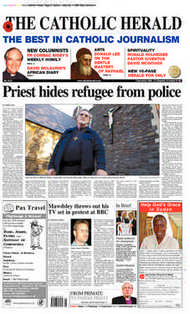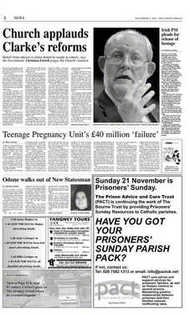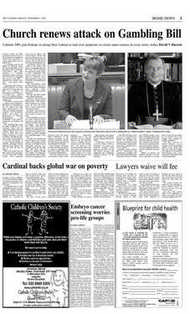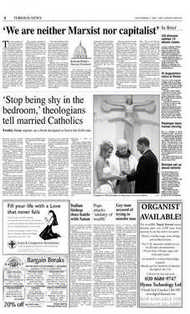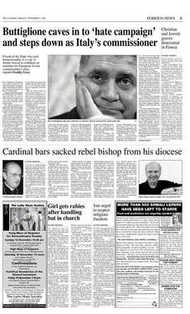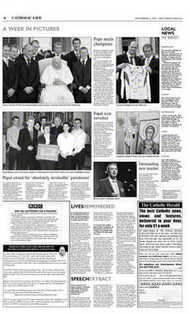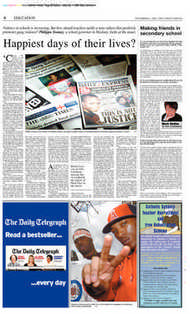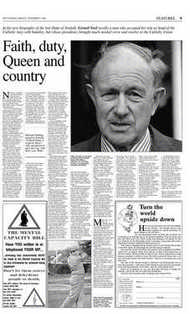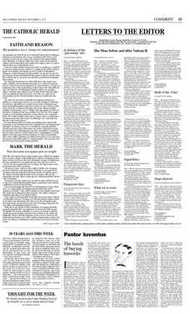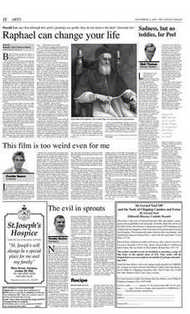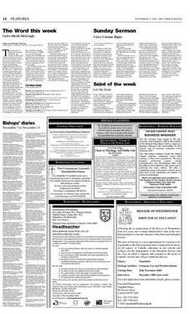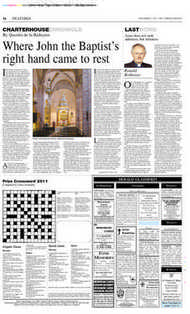Page 3, 5th November 2004
Page 3
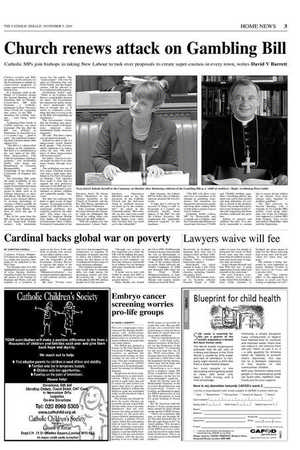
Report an error
Noticed an error on this page?If you've noticed an error in this article please click here to report it.
Tags
Share
Related articles
In Coverage Of Joffe Bill
Letter Piles Pressure On Brown To Grant Free Vote
Bishops Demand Free Vote On Chimera Bill
Catholic Mps Swing Both Ways On Hanging Vote
Brown Grants Labour Mps Free
Church renews attack on Gambling Bill
Catholic MPs join bishops in taking New Labour to task over proposals to create super-casinos in every town, writes David V Barrett
CHURCH LEADERS and MPs are piling on the pressure for the Government to rethink its controversial proposals to create super-casinos in every British town.
In a dramatic clash in the House of Commons during the Second Reading of the Gambling Bill on Monday, Conservative MP John Gummer, a Catholic, harangued Culture Secretary Tessa Jowell for suggesting that critics of the Bill including the Catholic bishops — were being “snobbish”.
Archbishop Peter Smith of Cardiff, however, was more restrained. The day after the Bill was debated in Parliament, he described it as a “a curate’s egg — good in parts”, but expressed continuing deep concerns about other aspects of it.
“The Bill is a valiant effort to tighten up the regulations. But there is a contradiction at the very heart of the Bill: these mega-casinos, with 1200 slot machines with huge jackpots,” said Archbishop Smith, who heads the Department of Christian Responsibility and Citizenship of the Bishops’ Conference of England and Wales.
The Gambling Bill curbs the ready availability of slot machines. They will no longer be permitted anywhere children might have easy access to them, such as in Chinese takeaways or minicab offices. The Bill also proposes a new criminal offence of inviting, permitting or causing a child to gamble. In addition, gambling websites operating from Britain will have to check the age of players.
But at the same time the Bill opens up the possibility of Las Vegas-style 24-hour casinos, with immediate access for the public. The “super-casinos” will even be open on Christmas Day and Good Friday and the largest casinos will be allowed to have unlimited jackpot prizes.
Archbishop Smith said: “There is no evidence that there is a great public demand for these. The Government has misread the public mood. I don’t understand why they’ve brought this in. It seems to contradict everything else they’re trying to do in the Bill, with tightening up regulations.” The Government claims that the building and operation of the casinos will regenerate deprived areas. Archbishop Smith, however, disagreed.
He said: “But that’s where you get deprived people.” Instead we need to ask if a mega-casino would benefit local people. “The Government’s intention is to reduce crime,” he said. “We don’t know if these mega-casinos will increase crime.” He added: “The more cynical might say that it is to raise more money through taxation.” The archbishop was one of five senior Christian leaders who had a joint letter published in The Daily Telegraph on Monday. “Our churches have made it clear that we support the new protective measures in the Bill and welcome the Government’s commitment to protect children and vulnerable people,” they wrote.
But they too criticised the plans to open scores of huge casinos: “It is paradoxical that one part of the Bill exists to ameliorate problems that could be created by the other part.” The letter was cosigned by Anglican Bishop Tom Butler of Southwark; Commissioner Shaw Clifton, Territorial Commander of the Salvation Army; Dr Alison Elliot, Moderator of the General Assembly of the Church of Scotland, and the Rev Will Morey, president of the Methodist Conference.
John Gummer mentioned this unity between the churches when he challenged Ms Jowell for calling those who criticised her Bill snobbish.
“Will she explain why she characterised Labour back benchers, Opposition Members such as me, the hierarchy of the Catholic Church and the Salvation Army as ‘snobbish’ because we stood up for the vulnerable?” he asked in the Commons debate. “How does she say that when that would mean that most of the historic Labour figures were ‘snobbish’ because they too stood up for the vulnerable?” John Grogan, the Labour MP for Selby, also a Catholic, likewise attacked Ms Jowell’s words.
“I hope that I will not be accused of being a snob or do-gooder if I express my profound doubts about aspects of the Bill,” he told the Culture Secretary. He emphasised the “potentially addictive capacity” of slot machines. “The Bill will allow rows and rows of machines to be situated in gambling warehouses. The machines are designed to mesmerise people and keep them making three or four pulls a minute to try to win £1 million.” Geraldine Smith, Labour MP for Morecambe and Lonsdale and a Catholic, told the Commons that Britain has somewhere between 275,000 and 370,000 problem gamblers. “Gambling addicts, like those who suffer from alcohol and drug addictions, are usually in denial of the problem. Those who accept that a problem exists are keen to hide it,” she said, suggesting that these numbers understate the problem.
Adding in spouses and children, she said, “it is perfectly reasonable to assume that in excess of one million of our citizens’ lives have already been blighted by problem gambling”.
The Bill received its Second Reading with a majority of 74. Catholic MPs mainly voted along party lines, but of the 14 Catholics who opposed it, Labour MPs John Grogan, Terry Lewis and Andrew Mackinlay voted with the Opposition.
blog comments powered by Disqus


